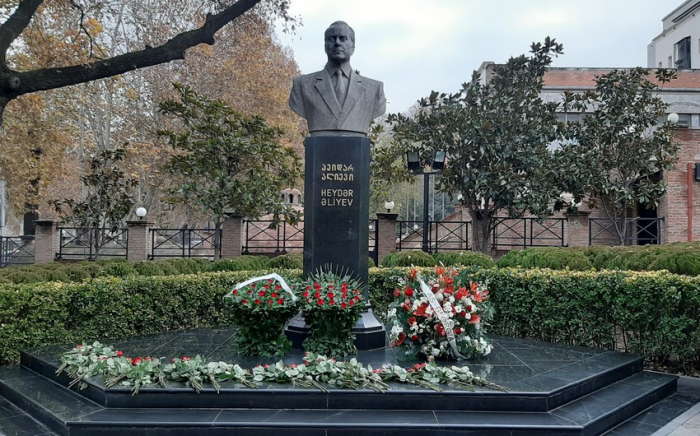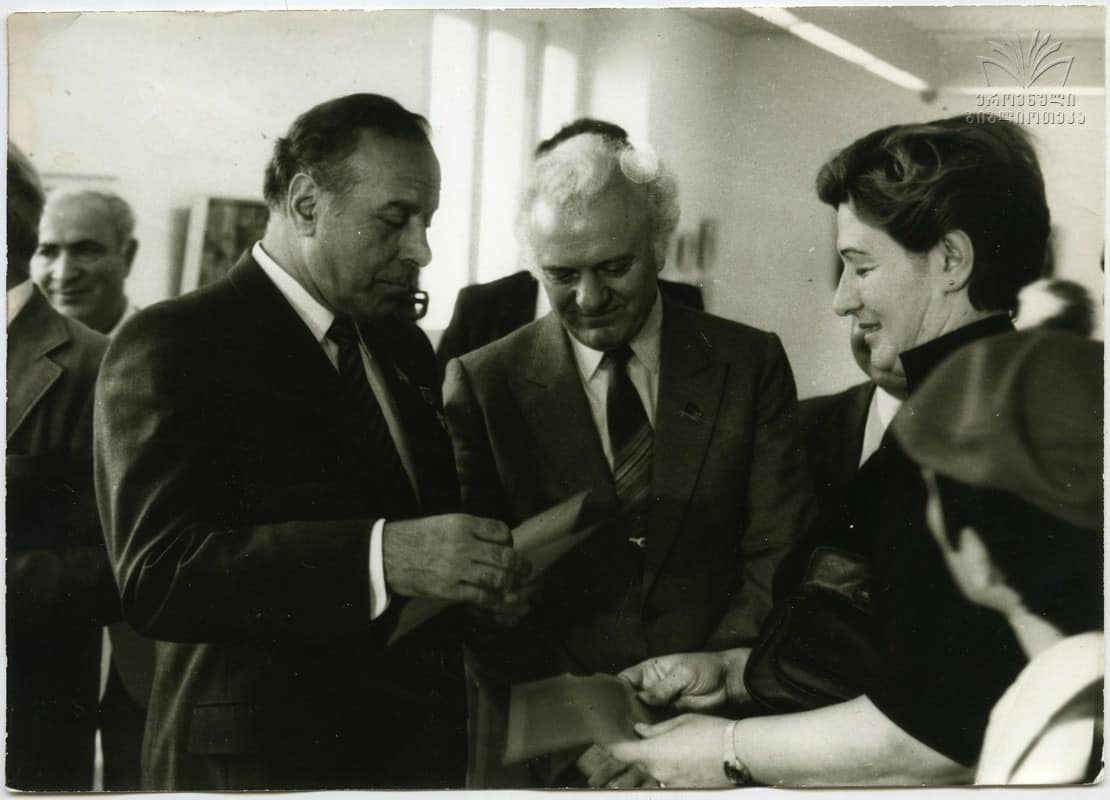10.05.23 15:45

On 10 May is the 100th anniversary of the birth of Heydar Aliyev, Azerbaijan's national leader. The role of this person in the history of Azerbaijan and the establishment of its independence is huge, but he also did a lot for the establishment of Georgian independence and brotherly and good-neighbourly relations between Georgia and Azerbaijan.
To begin with, when Heydar Aliyev became President of Azerbaijan in October 1993, Georgia needed external help and support as never before. At that time the Kremlin was in fact blocking outside help by organizing separatism in Abkhazia and carrying out mass ethnic cleansing of Georgian population of Abkhazia with the hands of separatists and Armenian fighters.
In 1993-1994, then, without support from friends from outside Georgia, against the background of the Abkhazian catastrophe, Georgia may well have been deprived of statehood. All the more so since both the Russian Federation and the Armenian lobby were not hiding their plans for the dismemberment of Georgia.
The situation was exacerbated by the complete and total economic dependence of war-torn Georgia on the Russian Federation, which in fact had committed aggression against it in Abkhazia. In such circumstances, Heydar Aliyev was the first to come to Georgia's aid, despite the difficult situation in Azerbaijan itself. First of all, energy supplies from Azerbaijan were established, which allowed Georgia to get rid of "suffocating" energy blackmailing from Russia at the most critical moment.

Also, few understand that the resistance against Armenian aggression in Karabakh, organized by Heydar Aliyev, prevented Armenian nationalists from opening a "second front" against Georgia. After all, together with the Abkhazian separatists they have just seized most of Abkhazia (except the upper part of the Kodori Gorge, which the same guerrillas of the Baghramyan battalion unsuccessfully stormed for months, but could not take).
It was threatened that, having quickly "dealt" with Azerbaijan in Karabakh, the Armenian fighters would be moved to Georgia. Here, with the support of the Russian military base in Akhalkalaki, an insurgency of "Javakhk" separatists "according to the Karabakh scenario" was already being prepared. In case of its implementation, the catastrophe of Georgia would be imminent.
Heydar Aliyev was able to stabilise the front, stopping the Russian-Armenian war machine in Karabakh, where the Russian army had to help its Armenian 'allies' tacitly. In such an environment, Azerbaijan began to provide Georgia with all the necessary economic and energy assistance. Eventually, the plans of the Kremlin and Armenian nationalists for the final defeat and division of Azerbaijan and Georgia (including annexation of Samskhe-Javakheti through separatism) failed.
Russia and Armenia were forced to confine themselves to a de facto occupation of Karabakh, the territories around Karabakh in Azerbaijan and Abkhazia, and Samachablo in Georgia. And later, when Russia began the Chechen war in late 1994, the Kremlin's ability to "divert forces" into the South Caucasus to implement anti-Georgian plans by Armenian nationalists (including the "Javakhk") was reduced. Georgia, on the other hand, in close collaboration with Turkey and Azerbaijan, began to rebuild its economy practically from scratch.
At the same time, the foundations were being laid for cooperation between Georgia and Azerbaijan in the field of energy transit, enabling the two countries of the southern Caucasus to get rid of Russia's monopoly in this sphere. On September 20, 1994 the Azerbaijani government signed a Contract of the Century with the world's major oil and gas corporations for the large-scale development of the Azeri-Chirag-Guneshli fields in the Azerbaijani sector of the Caspian Sea. From the outset, the project envisaged transit of produced oil through Georgia rather than Russia. For this purpose, as part of the contract for the development of the Azeri-Chirag-Guneshli fields, an agreement was signed on the construction of a new transit route - the Baku-Supsa oil pipeline.
The Baku-Supsa pipeline agreement was signed in March 1996, during the first official visit of Azerbaijani President Heydar Aliyev to Georgia. A Treaty on Strengthening Friendship, Cooperation and Mutual Security and a Declaration on Peace, Security and Cooperation in the Caucasus Region were also signed during that visit. The Baku-Supsa oil pipeline, despite Georgia's dire economic situation, was built as quickly as possible and began transporting oil on April 17, 1999.
The next major joint project between Azerbaijan and Georgia, initiated by Heydar Aliyev, was the Baku-Tbilisi-Ceyhan oil pipeline. Its importance was all the more important for preserving the territorial integrity of Georgia. After all, the pipeline route passed through Samtskhe-Javkheti, a region that Armenian nationalists had dreamt of seizing from Georgia. Thus, there was an international economic interest in the "consolidation" of Georgian unity.
The pipeline project was initiated after a declaration was signed in Ankara on October 29, 1998, and construction of the pipeline began in Baku on September 18, 2002. The pipeline is named after Heydar Aliyev, who unfortunately did not survive to see it commissioned in 2006. Such large-scale projects initiated by him as a transit pipeline through Georgia and Baku-Tbilisi-Kars railway function successfully. Today they guarantee Georgia's dynamic economic development and strengthen its cooperation with neighbouring countries, first of all with Azerbaijan and Georgia. Also, Azerbaijan, represented by SOCAR, is the main supplier of natural gas to the Georgian domestic market, providing competitiveness to the Georgian economy and freeing it completely from gas dependence on Russia.
The Georgian people remember national leader Heydar Aliyev with gratitude. There are monuments to him in three places in Georgia and there are cultural centres dedicated to him. And of course it is important for Georgia and the Georgian people that Heydar Aliyev consistently supported the restoration of the territorial integrity of Georgia and the return of Georgian refugees to their homes. Moreover, the pain of Georgian refugees, who lost their homes, was close to Heydar Aliyev as no one else. After all, he had to deal with the need to settle over 1 million Azerbaijani refugees from occupied Karabakh and over 200 thousand from the territory of the Republic of Armenia (historical western Azerbaijan).
Heydar Aliyev's parents' native village of Urud in Zangezur was also subjected to "ethnic cleansing. Today this village, from which Armenian nationalists expelled all its native Azerbaijanis, is practically deserted. The invaders never took root in a land that was foreign to them. Similarly, many Georgian villages in Abkhazia and the Tskhinvali region, from which the Georgian population was expelled, are deserted and destroyed.
However, the process of restoring historical justice cannot be reversed. In the course of the 44-day war, the verdict to the "Artsakh" separatist project has been signed and the return of Azerbaijani refugees to Karabakh has begun. And this means that the elimination of separatist projects in Abkhazia and Tskhinvali region, and the return of Georgian refugees to their homes, and also the return of native Azerbaijanis to their historical lands in western Azerbaijan, including Zangezur, is inevitable. And this is the only way to build a new Caucasus of peace, dreamed by Heydar Aliyev, by giving people the opportunity to live on their native land, regardless of their ethnicity.
Grigol Giorgadze
Read: 964
Write comment
(In their comments, readers should avoid expressing religious, racial and national discrimination, not use offensive and derogatory expressions, as well as appeals that are contrary to the law)
News feed
-
Georgian Defence Minister highlights “active” cooperation with US Defence Department
18:0026.07.24
-
Georgian PM says rehabilitation of historical Leuville Estate to conclude in 2026
17:1226.07.24
-
Culture Minister expects Georgian flag to fly, anthem played many times in Paris
16:4126.07.24
-
16:1026.07.24
-
Irakli Kobakhidze on terrorism threats: We have all the resources to oppose such plans
15:3826.07.24
-
15:0026.07.24
-
Speaker: Opposition's main goal to come into power, be puppet regime ruled by foreign forces
14:1026.07.24
-
Two missing citizens found in Svaneti
13:2726.07.24
-
13:0026.07.24
-
Georgia Global Utilities announces issuance of $300 Million Green Bonds
12:1726.07.24
-
Can Abkhazians calm down now that the law on housing in Abkhazia has been withdrawn?
11:4026.07.24
-
PM attends Sports Summit and a Reception in Paris
11:0026.07.24
-
NBG Acting President attends opening ceremony of 1st Authorised Investment Fund in Georgia
10:0526.07.24
-
18:0025.07.24
-
17:3025.07.24
-
Georgian passport advances 6 positions in int’l ranking on visa-free travel
16:4825.07.24
-
Georgian PM says “accelerating” economic growth Govt’s “most important national task”
16:0525.07.24
-
Media representatives were attacked while performing their professional duty in Tbilisi
15:3025.07.24
-
Levan Davitashvili: The construction partner of Anaklia port will be announced tomorrow
14:5025.07.24
-
NBG: National currency loans up by 785.90 million GEL, foreign currency by 180.28 million GEL
14:0525.07.24
-
13:3025.07.24
-
12:4825.07.24
-
Defense Minister: Increasing funding annually to strengthen defense capabilities
12:0325.07.24
-
11:3425.07.24
-
11:0525.07.24
-
10:2825.07.24
-
Iago Khvichia - The investigation started in SSS is based on conspiracy theories
18:0024.07.24
-
Until July 28, there will be occasional rainy weather in Georgia
17:3324.07.24
-
NDI is launching a long-term assessment mission for the 2024 parliamentary elections
17:0024.07.24
-
16:3524.07.24
-
Kakha Okriashvili about GD - Double and triple play will lead to war
16:0124.07.24
-
15:3024.07.24
-
Occupiers will 'burn' Abkhazians 'with a hot iron' for their 'Russophobia
14:5524.07.24
-
State Budget Received Record Revenue From Gasoline And Diesel Excise Tax
14:1024.07.24
-
13:0124.07.24
-
12:4124.07.24


